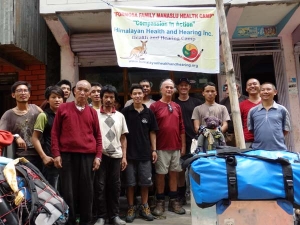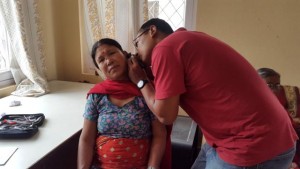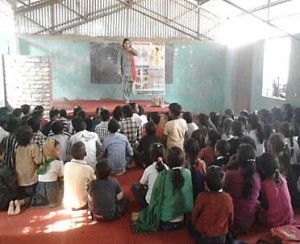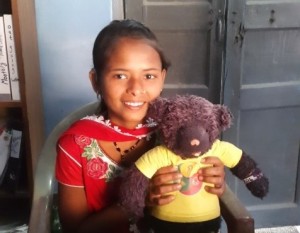From there to here … 2010 – 2017

The Abbot of Kopan Monastery Kenrinpoche Lama Lhundrup discusses our program with Sue and mascots Black Bear and Rachel. The seed to visit Tsum Valley is sown!
A Guru in a monastery in Nepal said it would be beneficial to establish a hearing care program in the remote regions of the country. It was January 2010. As a marine engineer, I had the engineering skills to establish reliable power supplies for delicate equipment, and my wife Sue (Audiologist) had nurtured through a certificate course in Audiometry. So why not? After all, if one is not living on the edge, then too much space is taken up!
We were members of the Nepal Australia Friendship Association who purchased our first 10 hearing aids to be offered to the hilly region of Tawal, that they had ‘adopted’.
We realised the need to be independent and so began camps under the ‘Hearing Nepal Program Inc.’ a registered charity in Australia with government approval for deductible gift recipient status for donations. This status required us to work through local authorities as service providers, and we had established a partnership with Nepal Association for the Hard of Hearing, providing them with equipment and training for audiometry assessment and digital hearing aid fittings. They were already successfully running primary ear care programs in local schools and community establishments. Keshab was our man! We assumed responsibility for his wages, as he had been a volunteer for three years, and it was time to secure his presence for the future!
The learning curve was steep, and it is only now that we think the light at the end of the tunnel may not be a train!
 In 2014 we changed our name to Himalayan Health and Hearing Inc. so we would not be identified with a specific country, more so a general region. We added the “Health” to encompass hearing health, and have been known to assist with other one off health programs in dire straights. On that list is a specific women’s health program in Dhanusha, earthquake relief , purchase of wheelchairs and lots of teddy bears distributed.
In 2014 we changed our name to Himalayan Health and Hearing Inc. so we would not be identified with a specific country, more so a general region. We added the “Health” to encompass hearing health, and have been known to assist with other one off health programs in dire straights. On that list is a specific women’s health program in Dhanusha, earthquake relief , purchase of wheelchairs and lots of teddy bears distributed.
Our strategy has been to select communities that were prepared to:-
- nurture the program
- provide personel for training
- continue following up the progress of people who had come to our camps for primary ear care or hearing rehab, including counselling and hearing aid fittings.
- ensure batteries were supplied, aids maintained, and broken aids returned to NAHOH for replacement.
We also request a donation be made to the local organisation if possible, for hearing aids and primary ear care. Full cost price is charged for the batteries. Elderly or differently-abled persons must come with a carer, who must accept the responsibility for the hearing aid, service it and see that it is correctly used. Of course, special cases prevail, each person we see, is our teacher!
We are also aware of the value of training school teachers in primary ear care and hearing related problems. To this end, we have trained staff, that go into the schools, talk to the kids and the teachers, screen anyone with a suspected hearing loss and or primary ear care issue, and refer them to our nearest hub.
A ‘hub’ is the centre of our operations in an area, and spokes to neighboring hearing camp sites ensures all have a permanent base from which they can seek help. Some of these spokes may become new ‘hubs’, and we organically grow!
So how does this translate into activities in the field?
Nepal program
 Twenty thousand have been to our primary ear camps and we have one thousand plus hearing aids out there. As in the west, not all can be bothered to wear them, even after carefully selected fitting criteria has been satisfied. Adults must have o HL > 55dBHL in the better ear, and satisfy us they have a need for them, with maintenance issues and affordability assessed. Children usually are fitted binaurally, with free batteries. One young lady has a bone conductor build into a colourful head band, eclipsed only by her smile. We have four hubs, NAHOH at Kirtipur, Shechen Clinic and Hospice at Boudha, Janakpur- Dhanusha region and a fledgling hub in Lumbini.
Twenty thousand have been to our primary ear camps and we have one thousand plus hearing aids out there. As in the west, not all can be bothered to wear them, even after carefully selected fitting criteria has been satisfied. Adults must have o HL > 55dBHL in the better ear, and satisfy us they have a need for them, with maintenance issues and affordability assessed. Children usually are fitted binaurally, with free batteries. One young lady has a bone conductor build into a colourful head band, eclipsed only by her smile. We have four hubs, NAHOH at Kirtipur, Shechen Clinic and Hospice at Boudha, Janakpur- Dhanusha region and a fledgling hub in Lumbini.
Janakpur program
 In Janakpur, we have partnered with the Community Family Welfare Association, where their accountant and our leading lady Kamala has attended remote training in Kathmandu and Lumbini and organises our camps when we visit with our team from Kathmandu and sometimes the Ladakh group is there too! Kamala has an effective school visiting program, and as accountant for the organisation, is well respected in the region. Others from the group are also in line for specific training, and now form the administration team for our camps. They are building a new office, which will incorporate a hearing ‘clinic’. We have helped a little towards this.
In Janakpur, we have partnered with the Community Family Welfare Association, where their accountant and our leading lady Kamala has attended remote training in Kathmandu and Lumbini and organises our camps when we visit with our team from Kathmandu and sometimes the Ladakh group is there too! Kamala has an effective school visiting program, and as accountant for the organisation, is well respected in the region. Others from the group are also in line for specific training, and now form the administration team for our camps. They are building a new office, which will incorporate a hearing ‘clinic’. We have helped a little towards this.
Ladakh Program
 In Ladakh, Himalayan region of India, we have just moved to a Tibetan Medicine clinic in a monastic institution for Nuns.We have also employed a local lady , Angmo, to manage our program there. Angmo came to the CGHH conference, and amonst other things, can now see it is a ‘real’ job, and great support is out there.
In Ladakh, Himalayan region of India, we have just moved to a Tibetan Medicine clinic in a monastic institution for Nuns.We have also employed a local lady , Angmo, to manage our program there. Angmo came to the CGHH conference, and amonst other things, can now see it is a ‘real’ job, and great support is out there.
This century belongs to the young ones, we must empower them to assume control, support them to the hilt and get out of their way!
